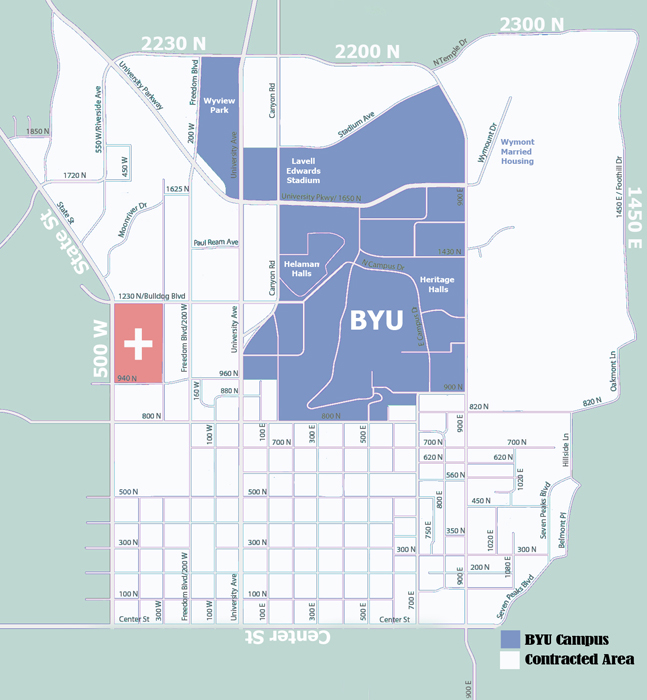Editor’s note: The Daily Universe received more than 100 comments on a June 5, 2017 Facebook post asking our readers about issues they have had with off-campus housing. Those comments led, in part, to the development of the BYU Off-Campus Housing Series.
Part Two – Housing quality doesn’t always live up to price, students say
Part Three – BYU students struggle to sell yearlong housing contracts
Part Four – Off-campus tenants and landlords clash over security deposits
Part Five – Students find ways to cope during “homeless week”
Part Six – Students share their housing horror stories
Part Seven – BYU-contracted housing: What to do if you have a problem
The BYU Off-Campus Housing Series — Part One
“Contracted housing” is one component that sets BYU apart from most universities in America, as well as internationally.

BYU has successfully battled several lawsuits related to its contracted housing program because of protections outlined in the Fair Housing Act. BYU is allowed to segregate student housing based on gender through a 1978 agreement with the U.S. Justice Department, stating that a private university can segregate housing for students based on moral standards.
BYU’s unique program of contracting off-campus housing for students has been around for more than 40 years.
Single undergraduate students must agree to live in these approved segregated housing complexes as part of their adherence to the Honor Code.
The university initially referred to its off-campus housing program as “BYU-approved housing,” but has since switched to “BYU-contracted housing.” The university does not reach out to off-campus facilities; rather, off-campus landlords, managers and agents approach BYU in order to become part of the contracted housing system.
Who is required to live in BYU-contracted housing?
BYU spokesman Todd Hollingshead said 77 percent of BYU undergraduate students are single, according to Fall 2016 data. This means approximately 23,400 single undergraduates are required to live on campus or in BYU-contracted housing.
BYU only offers 5,459 beds on-campus for single student housing in Helaman Halls, Heritage Halls and Wyview Park. Many students choose to live in off-campus apartments. Off-Campus Housing Office general manager Garry Briggs said BYU’s goal is to provide students with a living environment that is conducive to their moral, spiritual and academic growth.
“We don’t have enough beds on campus for everybody, so we partner with our off-campus owners,” Briggs said.
Post baccalaureate and married students are not required to live in contracted housing. Briggs said graduate students can live in BYU-contracted housing, but they don’t need to.
How do properties become BYU-contracted?
For a housing complex to become BYU-contracted, the owner needs to provide a layout of the unit, provide a business plan to meet residential standards and enforce BYU’s Honor Code, and agree to use BYU’s student-landlord rental agreement. The contracts with the university are only valid for a year and must be renewed annually.
The university contracts off-campus living units whose owners have agreed to:
- Adequately separate single men and women.
- Exercise reasonable efforts to maintain the BYU Residential Living Standards.
- Maintain the facilities in good repair.
- Not abuse basic tenant rights.
Off-campus housing managers agree to monitor the units, take care of their facilities and provide furniture and amenities, such as running water and toilets that flush.
“Once they get in (the system) that doesn’t mean now they can do whatever they want,” Briggs said. “They still have standards, and if we have problems with an owner not addressing the needs or addressing conflicts with roommates or maintaining the facilities, then they’ll be dropped from the system.”
Briggs said the biggest reason a property isn’t approved is its layout.
“We want to bring in facilities that will provide the tenants with some privacy,” Briggs said. “Say for instance, a bedroom goes off a living room or kitchen and say you’d have to walk from your bedroom through the living room or the kitchen to get to the bathroom, it just doesn’t work because we don’t want the students to have to deal with that.”
Other reasons housing units may not be contracted could be inadequate parking, location or aspects of the business plan that don’t meet BYU’s needs.
The university decided to look at where the majority of students were living back in 2003 because the contracted housing was spread all over the county. BYU had contracted properties all around UVU and down south toward Springville.
Briggs said most of the problems in those areas came from non-BYU students, but since they were part of the system, BYU had to address those concerns. This influenced the decision to create boundaries in order to better focus on BYU students. The current boundaries reflect where 95 percent of BYU’s students were living and was implemented in 2007.

Are there exceptions for living in non-BYU-contracted housing?
BYU offers waivers to undergraduate students who live with parents or family members, take classes away from campus or have special circumstances or hardships.
Briggs said there are multiple circumstances that could qualify, including health issues, financial issues or space requirements to accommodate classwork demands — for example, art majors with large canvases.
“The hardships and special circumstances — we look at those and make a committee decision on whether or not to approve those or to ask for more information,” Briggs said. “We don’t like to grant a lot of waivers because that means they are living in places that aren’t contracted, and then if they have problems with roommates or the facilities we don’t have any leverage to help them.”
The general waiver requires all roommates to agree to abide by the residential living standards. If the roommates refuse to sign, then the Off-Campus Housing Office will work with the waiver applicant to find a different place to live. Briggs said all roommates must sign the waiver regardless of whether they are BYU students because the housing office doesn’t want the waiver applicant living in a bad environment where there may be cigarette butts or alcohol present.
Demand for off-campus housing
BYU business management student Alex Teemsma said the concept of university-approved housing is great because it helps protect students’ safety and prevents situations contrary to the Honor Code.
“However, as single BYU students are strongly encouraged to reside within the off-campus housing boundaries, it is the landlords that have the upper hand in leasor-leasee agreements,” Teemsma said. “Though many landlords are good, there are those who may take advantage of the situation, charging more and failing to keep up their properties.”
Teemsma said boundaries defined by the university influence the supply and demand of properties available to students because growth can only happen within these boundaries.
“For BYU students, the housing search is further complicated each semester as students from other universities and schools and non-students who, to the best of my knowledge are not restricted in where they may live, occupy BYU-approved housing spots,” Teemsma said. “It is my opinion that if students from other institutions and non-students are permitted to live in BYU-approved housing, BYU students should at the least have more (off-campus housing) options available to them.”
Teemsma said finding good BYU-contracted housing isn’t necessarily difficult, but students often compromise on something, whether it be cost, location or amenities.
Brady Anderson has managed 50 East LLC Houses for the past three years. The property consists of nine houses converted to apartments, all of which are currently not BYU-contracted. Married students buy some of the contracts, but about a third of Anderson’s tenants are single BYU students.
Anderson said the BYU-contracted system doesn’t have a huge impact on the housing market in Provo.
“Students are going to do what they want to do,” Anderson said. “If they want to live here they will fill out a waiver, and if it’s not approved they find somewhere else.”
Anderson said it doesn’t affect him as a manager because his contracts always fill up, and most are sold months in advance.
“It influences the students and the way they live because they just have to jump through hoops,” Anderson said.
What are the benefits of the contracted housing program?
Briggs said the biggest benefit of having the BYU-contracted housing system is it allows BYU to help students when they’re in trouble.
“Many (students) are here for the first time away from home, so we’re here to help them,” Briggs said. “The big thing I would encourage students to do when they’re looking for a place is to check and make sure it’s contracted.”
Students can check the Off-Campus Housing website to see if a unit is contracted. Briggs also recommended physically going to an apartment or talking with people who have lived there before signing a contract.
The Off-Campus Housing Office does not regularly monitor or visit contracted properties, so students are responsible for finding appropriate housing.
Briggs said if students are having issues, they need to first address their manager, agent or landlord. Students should then contact the Off-Campus Housing Office if the issue was unaddressed. BYU students also have the option of going to the Center for Conflict Resolution on campus for mediation.




